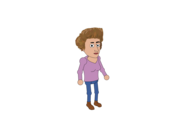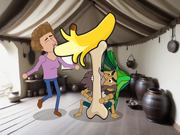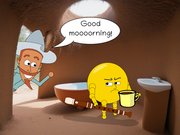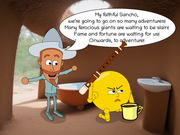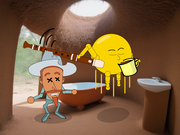但
但 character breakdown
"person" radical in Chinese characters (Kangxi radical 9)
亻
=
丿
+
丨
:
Mnemonic symbol: Rosa Luxemburg. She's quite radical, and her name starts with "r", just like "ren2". Also, 亻appears at the left-hand side of characters, and Rosa is a leftist as well.
Robinson Crusoe (r) and Rosa Luxemburg (亻) are having their favorite snacks in the encampment's kitchen: Rosa is eating a banana (丿) and Robinson is eating a dinosaur bone (丨).
Robinson Crusoe (r) and Rosa Luxemburg (亻) are having their favorite snacks in the encampment's kitchen: Rosa is eating a banana (丿) and Robinson is eating a dinosaur bone (丨).
dawn / morning / daybreak / day / dan, female roles in Chinese opera (traditionally played by specialized male actors)
旦
=
一
+
日
:
Mnemonic symbol: A big mug, since many people start the day with a mug of coffee.
Don Quixote (d) meets the sun (日) early in the morning (旦) in the anthill's bathroom (an4). Don Quixote is full of energy and can't wait to start into a new adventure, but since the sun is a morning grouch who only just started drinking her mug of coffee (mnemonic symbol for 旦) she cannot stand it and beats him over the head with a flute (一) to calm him a bit down.
Don Quixote (d) meets the sun (日) early in the morning (旦) in the anthill's bathroom (an4). Don Quixote is full of energy and can't wait to start into a new adventure, but since the sun is a morning grouch who only just started drinking her mug of coffee (mnemonic symbol for 旦) she cannot stand it and beats him over the head with a flute (一) to calm him a bit down.
Characters with 但 as component
variant of 夜[ye4]
夜
=
亠
+
亻
+
丶
+
夂
:
Mnemonic symbol: 夜壶, chamber pot.
In the middle of the night, Maud Younger and Rosa Luxemburg bump into each other as they are emptying their chamber pot in the elevator's bathroom. They covered their chamber pots with a petal leaf and a beret respectively, and as they carry them they take care to walk very slowly in their high heels.
In the middle of the night, Maud Younger and Rosa Luxemburg bump into each other as they are emptying their chamber pot in the elevator's bathroom. They covered their chamber pots with a petal leaf and a beret respectively, and as they carry them they take care to walk very slowly in their high heels.
